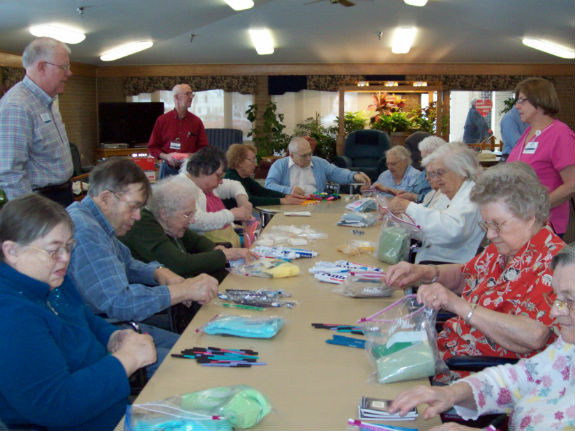
A Hidden People in Plain View
Reaching our aging population
When Oscar was admitted to the senior care center where I was privileged to serve as chaplain, I quickly learned that he had no interest in God. Yet we soon developed common ground: He had served in the Navy during World War II, so I brought in some pictures my Dad had taken during the war, which prompted a lot of dialogue.
Over the months that followed, I continued to build a bridge of friendship with Oscar, much to the amazement of his family. One unforgettable Wednesday afternoon, when I walked into Oscar’s room, he said to me in a loud voice, “I don’t see how God could forgive me for all the stuff I have done.”
Stunned by those honest words of regret and despair, I sat down by my friend’s bed and shared some of the promises found in God’s Word, such as 1 John 1:9—that if we confess our sins, He is faithful and just to forgive us our sins and to cleanse us from all unrighteousness. I shared, too, that when we repent of our sins and ask for God’s forgiveness, He places all our sins behind His back and remembers them no more.
Remembering our many talks about his experiences at sea, I shared with him Micah 7:19, where God declares that He will hurl all our iniquities into the depths of the sea.
I shall never forget the expression on Oscar’s face. It was as if a light bulb turned on as he understood that God could and would forgive him for all that he had done. We prayed together before I left. When I returned later that evening to gather residents for our worship service, Oscar’s room was empty, and I was told he’d been taken to the hospital for a possible stroke. Oscar never regained consciousness.
Altogether, more than 800 men and women passed into eternity while I served at Park View Care Center in Buffalo, Minnesota, from 2000 to 2014. It’s both a privilege and a regular grief to love and serve people to the end of their journeys.

Ministry opportunities in plain view
In his book, Trashed or Treasured: A short, practical theology of aging, Glenn Havumaki writes, “1.8 million older adults live in the nursing homes of America, and each year two-thirds of them die and are replaced as quickly as they can clean the rooms.”
In mission terminology this is “a hidden people” who live in plain view of every church, many of whom might welcome the glorious message of the gospel—that God is ready, willing and able to forgive.
In 1927 members of Evangelical Free Churches in Minnesota developed a ministry to help the elderly with their medical and physical needs. They began with a nursing home and called it Elim, after the biblical oasis on the Israelites’ escape route from Egypt (Exodus 15:27).
Fittingly, Elim Care’s ministries offer physical, emotional and spiritual refreshment through skilled nursing, assisted living and independent living on 14 different campuses in Minnesota, North Dakota and Iowa. Each community offers spiritual care through the services of a chaplain with EFCA ministerial credentials. Though now a nonprofit corporation, Elim Care is endorsed by the EFCA as a preferred provider.
Of course, some of those we serve through Elim are believers with a continued passion for ministry, like Marv.

Marv arrived on our campus around 2006, suffering from muscular dystrophy, which had forced him to use a wheelchair. Fortunately, a power chair allowed him great mobility. I taught Marv to run the computer in the sound/projection room and change the slides as needed, so for more than three years, this was his ministry. We even created a sign for the door, calling it “Marv’s Office.” He was thrilled.
When his hands would no longer allow him to work the computer, he retired from that ministry. Next, the muscular dystrophy forced Marv to give up his power chair and depend on others to push him in a regular wheelchair. When I visited recently, I reminded him that I would see him either in July on my next visit or later in our Lord's presence.
Even if there isn’t an Elim Care facility near your church, their website offers helpful resources for reaching out to the hidden people nearby, including chaplains’ messages and pertinent articles on health and caregiving.
Like Oscar, members of our aging population need to hear the good news that they can be forgiven. Consider launching a team to start building bridges to a hidden people in your plain view.
Send a Response
Share your thoughts with the author.